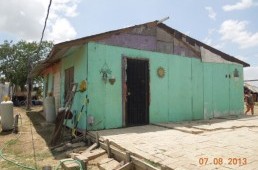
February 13, 2015 | by Katie Claflin
Categories: Affordable Housing, Construction, Home Rehabilitation/Repairs, Homeownership
The cost of living tends to be cheaper in rural areas, so why are rural Americans facing an affordable housing crisis? A January 2015 article in The Atlantic offers an explanation.
The article explains that, although housing is cheaper in rural communities, income is lower due to limited job opportunities. According to 2012 data from the Housing Assistance Council, the poverty rate in rural America is 17%, compared to the national poverty rate of 14%.
At the same time, the available housing stock is deteriorating, with many rural homeowners unable to afford the cost of repairs. And developers interested in building new homes often face infrastructure hurdles, such as a lack of access to water and sewer lines, which further reduces rural Americans’ access to quality affordable homes.
These problems have been compounded by the recent decline in federal aid to rural areas. For example, the budget for the U.S. Department of Agriculture’s 502 Direct Loan Program—which provides mortgages and home improvement loans for very low-income rural Americans—has been reduced from $2.1 billion in 2010 to $828 million in 2013.
In a state as large as Texas, the rural housing crisis is even more acute. Citing research conducted by Bowen National Research, a Federal Reserve Bank of Dallas article indicates that affordable housing continues to be a pressing need in 177 counties that were identified as rural in nature.
In an effort to address Texas' rural housing shortage, TSAHC has made it a priority to serve rural communities as part of our Texas Foundations Fund grant-making program. We commit to providing at least one grant per funding cycle to fund home repairs or supportive housing services, such as adult education and job training, in rural areas.
Click here to learn more about the Texas Foundations Fund.
On the House blog posts are meant to provide general information on various housing-related issues, research and programs. We are not liable for any errors or inaccuracies in the information provided by blog sources. Furthermore, this blog is not legal advice and should not be used as a substitute for legal advice from a licensed professional attorney.
Me and my family are trying to buy a piece of land in are area and put a house on it .we r first time buyers with low income but we work to make ends meet .we are fortunate to have been eligible for a small loan to finance a home just have a hard time with all cost and are afraid to not make it just need some help for me and my family we are country people that lived on a ranch for a long time but have been told to move for ranch ownership change over .thus has been are home for 15 years now forced out with low funds please respond thank you
I have two kinds we need help to get a place to stay my number is 469 740 0012 I
Thank you for highlighting this issue. We often hear about the lack of affordable housing in big cities like San Francisco and New York, but rural areas are often overlooked. One issue involves the lack of demand for the low income housing tax credit tied to projects in these locations, primarily because the locations are outside of most bank CRA markets. We are looking to address this issue by selling the credits to non-bank buyers, either small companies or individuals, because the demand for affordable housing is everywhere. Allocation of LIHTC credit should not depend on the location of the nearest bank branch.
Jim Groves-Founder
Lihtec Funding
222 W. Merchandise Mart Plaza, Suite 1212
Chicago, IL 60654
888-970-0935 ext 1
.(JavaScript must be enabled to view this email address)
Twitter: @lihtec
http://lihtec.com
TSAHC reviews all blog comments before they are posted to ensure a positive experience for our online community. Off-topic comments; hostile, derogatory or deliberately insulting comments; and comments specifically promoting goods and services will not be posted.
Approved comments will be published in their entirety. Personal information will not be removed unless it pertains to someone other than the person submitting the comment. For more information, please see our Comment Posting Guidelines.
To remove a previously submitted and published comment, please contact Anna Orendain at [email protected].
If you have a question regarding any of TSAHC's programs, please contact us.

Hi Michael, our homeownership programs cannot be used to purchase land, but you can use our programs to finance the home after you’ve purchased the land. Here’s a link to our eligibility quiz to help you determine if you qualify: http://www.tsahc.org/homebuyers-renters/take-the-eligibility-quiz
The USDA offers a program that can be used to purchase land and construct a home in qualifying rural areas. I encourage you to review their eligibility requirements to see if you are fit for their programs: http://www.rd.usda.gov/programs-services/single-family-housing-direct-home-loans